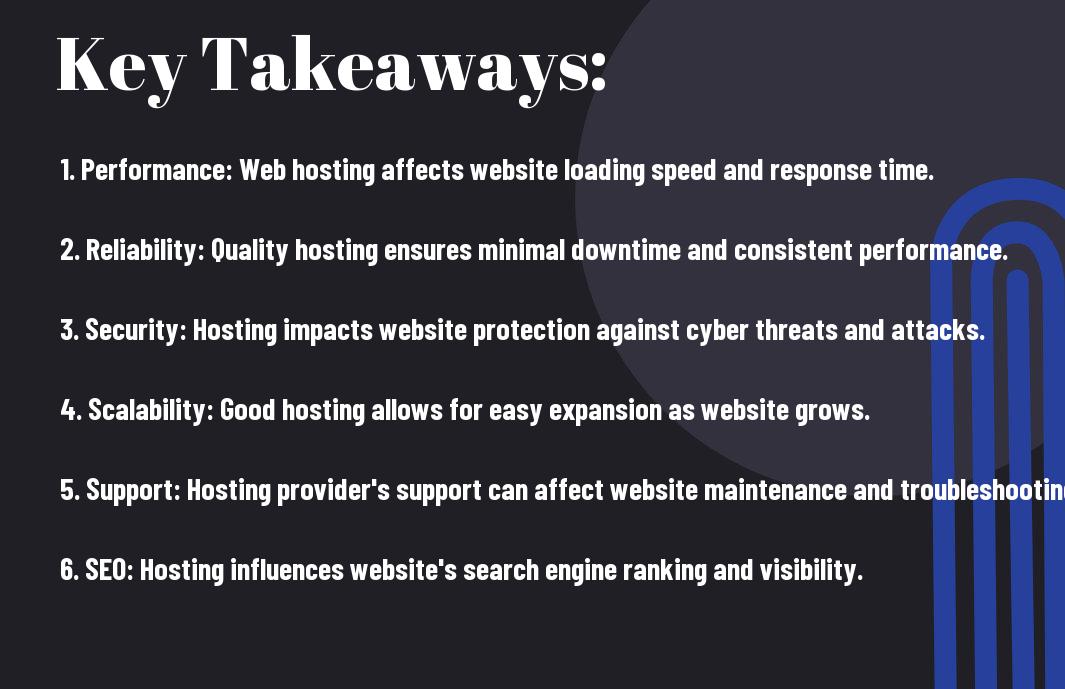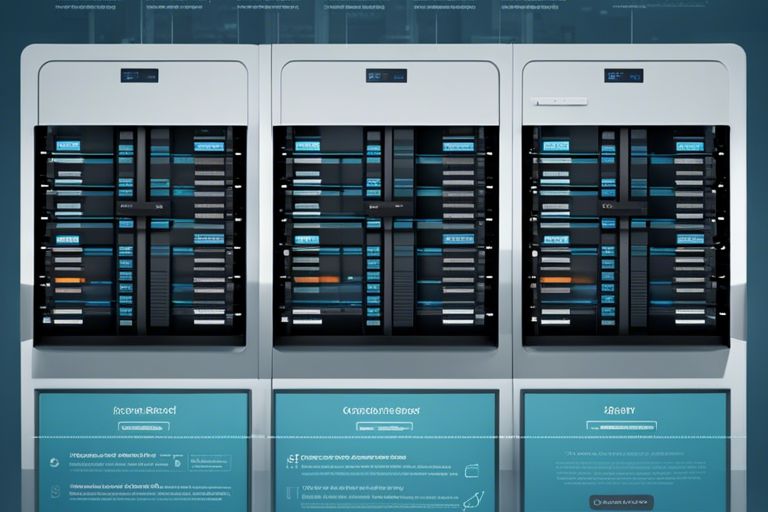Web hosting plays a crucial role in the design and functionality of your website. The hosting provider you choose can significantly impact the performance, security, and user experience of your site. Whether you are a small business owner, a blogger, or an e-commerce site, the right web hosting can make a huge difference in the success of your online presence. In this blog post, we will explore the various ways in which web hosting affects website design and offer tips on selecting the best hosting option for your specific needs.
Key Takeaways:
- Web hosting directly impacts website performance: The choice of web hosting provider can significantly affect the speed and overall performance of a website. Factors such as server uptime, bandwidth, and storage capacity all play a crucial role in delivering a seamless user experience.
- Web hosting influences website security: The level of security provided by a web hosting company has a direct impact on the safety of a website. A reliable hosting provider should offer features such as SSL certificates, firewalls, and regular security updates to protect against cyber threats.
- Compatibility with website design tools: The features and limitations of a web hosting plan can impact the use of design tools and software. It’s important to choose a hosting provider that supports the technologies and frameworks required for the desired website design.

Understanding Web Hosting
Obviously, choosing the right web hosting for your website is crucial to its success. Your choice of web host can have an impact on your website performance. According to ZenBusiness, factors such as page loading speed, security, and uptime are directly affected by your web hosting provider.
Types of Web Hosting Services
When it comes to web hosting, there are several options available to you. The most common types of web hosting services include shared hosting, VPS hosting, dedicated hosting, and cloud hosting. Each of these options has its advantages and disadvantages, and the right choice for you will depend on your specific needs and budget. Perceiving the differences between these services will help you make an informed decision for your website.
| Shared Hosting | VPS Hosting |
|---|---|
| Most affordable option | Offers more control and flexibility |
| Resources are shared with other websites | Provides a dedicated server space |
| Ideal for small websites and beginners | Suitable for growing websites |
| May have slower performance during high traffic | More expensive than shared hosting |
| Limited customization options | Requires technical knowledge to manage |
Crucial Web Hosting Features for Designers
As a web designer, certain features are essential for your web hosting provider to offer. Reliable uptime, scalability, security measures, automated backups, and 24/7 customer support are some of the most crucial aspects to consider. These features will ensure that your website is always accessible, can handle increased traffic, remains protected from potential threats, and has the necessary support in case of any issues. By choosing a web hosting service that provides these features, you can effectively support your website design efforts.
Web Hosting Considerations for Website Design
Despite the focus on website design and aesthetics, the foundation of your website’s performance and reliability is heavily reliant on your choice of web hosting. Your web hosting provider plays a crucial role in determining the overall success of your website. It’s essential to understand the key considerations for web hosting to ensure optimal website design and functionality.
Speed and Performance Impacts
When it comes to website design, speed and performance are paramount. The web hosting service you choose directly impacts the loading speed of your website. Slow loading times can lead to visitor frustration and a higher bounce rate. If your website takes too long to load, you risk losing potential customers and harming your search engine rankings. A reliable web hosting provider will offer fast server response times and high-speed connectivity to ensure your website loads quickly and efficiently for your visitors.
Uptime and Reliability
Uptime and reliability are critical factors when considering web hosting for your website design. Uptime refers to the amount of time your website is accessible and operational. Downtime can be detrimental to your online presence, leading to lost revenue and a negative user experience. It’s essential to choose a web hosting provider that guarantees high uptime percentages and offers reliable servers. Your website’s reputation and credibility hinge on the reliability of your web hosting provider.
Advanced Web Hosting Features
Unlike basic web hosting, advanced web hosting features offer a range of benefits that can greatly impact your website design and performance. Some of the key features to look out for include:
- Content Delivery Networks (CDNs)
- Scalability and Responsive Design
- SSD Storage
- Managed Hosting
When considering web hosting, it’s important to understand how these features can enhance your website and ultimately contribute to a better user experience. Let’s break down some of these features in detail:
Content Delivery Networks (CDNs) and Design
When it comes to website design, the use of a Content Delivery Network (CDN) can have a significant impact on your site’s performance. A CDN helps to distribute your website’s content across multiple servers located in different geographical regions, allowing for faster delivery of your web pages, images, and other media to users around the world. By utilizing a CDN, you can improve the loading speed of your website, which is crucial for keeping visitors engaged and satisfied with their browsing experience.
Scalability and Responsive Design
Another important factor to consider in website design is scalability and responsive design. A reliable web hosting service that offers scalable resources allows your website to handle increases in traffic without compromising on performance. This is especially important for growing businesses or websites experiencing seasonal spikes in traffic. Additionally, responsive design ensures that your website is easily accessible and navigable across various devices and screen sizes. You want to ensure that your website looks and functions seamlessly, whether it’s being viewed on a desktop, mobile phone, or tablet.

Best Practices for Web Designers
Now that you understand the impact of web hosting on website design, it’s important to consider the best practices for web designers when it comes to selecting a hosting service. Before you dive into the technical aspects of web design, it’s crucial to consider the foundation of your website – the web hosting provider. To delve deeper into this topic, you can refer to the insightful article, Does Your Choice of Web Host Affect Your Website? | WDD, which provides valuable insights into the correlation between web hosting and website performance.
Selecting the Right Hosting Service
When considering a hosting service for your website, reliability and speed should be at the top of your priority list. A reliable hosting service ensures that your website is consistently accessible to visitors, while fast loading times are crucial for providing a seamless user experience. Additionally, you should consider the scalability of the hosting service to accommodate potential growth in your website traffic. Therefore, it is imperative to thoroughly research and review the performance of different hosting providers before making a decision.
Collaborating with Hosting Providers for Optimal Design
Effective collaboration with your hosting provider can significantly impact the security and performance of your website. By working closely with your hosting provider, you can ensure that the technical aspects of your website, such as server configurations and security measures, are optimized for optimal design. Additionally, seeking support from your hosting provider for technical issues can help you maintain a stable and secure online presence.
The Impact of Web Hosting on Website Design
The impact of web hosting on website design is significant and cannot be overlooked. Your choice of web hosting can directly affect the speed, security, and overall performance of your website. It is important to consider factors such as server location, uptime reliability, and scalability when selecting a web hosting provider. Your website’s success and user experience are heavily dependent on the quality of your hosting provider. By understanding the impact of web hosting on website design, you can make informed decisions that will ultimately benefit your online presence and business.
FAQ
Q: What is web hosting and how does it impact website design?
A: Web hosting is a service that allows individuals and organizations to make their website accessible via the World Wide Web. The type of web hosting service you choose can have a significant impact on the performance and design of your website. For example, a reliable web hosting service can lead to faster loading times and better overall user experience, while an unreliable service can result in downtime and slow website performance.
Q: How does the choice of web hosting affect website loading times?
A: The choice of web hosting can have a direct impact on website loading times. A reliable web hosting service with fast servers and high bandwidth can lead to faster loading times, improving user experience and search engine rankings. On the other hand, a low-quality web hosting service with slow servers and limited bandwidth can result in slow loading times, causing users to abandon the website and negatively impacting its performance.
Q: What role does web hosting play in website security?
A: Web hosting plays a crucial role in website security. A reputable web hosting provider will offer features such as SSL certificates, firewalls, and regular security updates to protect websites from cyber threats. In contrast, a low-quality web hosting service may lack these security measures, leaving the website vulnerable to hacking and malware attacks.
Q: How does web hosting impact website scalability and flexibility?
A: The choice of web hosting can impact a website’s scalability and flexibility. A high-quality web hosting service will offer options for scaling resources, such as bandwidth and storage, to accommodate the growth of a website. Additionally, a reliable web hosting provider can offer various hosting plans and options, giving website owners the flexibility to upgrade or downgrade as needed. In contrast, a low-quality web hosting service may limit these options, making it difficult to adjust resources according to the website’s needs.
Q: What are the implications of web hosting on website design and user experience?
A: The implications of web hosting on website design and user experience are significant. A reliable web hosting service can contribute to a well-designed website with fast loading times, strong security, and the ability to handle high traffic. This, in turn, enhances user experience, boosts search engine rankings, and improves the overall performance of the website. Conversely, a poor choice of web hosting can result in an underperforming website with slow loading times, security vulnerabilities, and a negative impact on user experience. Therefore, the selection of web hosting is a critical factor in website design and user satisfaction.
CATEGORY:Web Hosting

